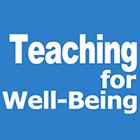Learning and Teaching For Wellbeing | Home Page
 College brochures typically display images of happy, healthy students in diverse clusters of smiling faces. But that upbeat image does not reflect the reality for many young adults in higher education. Stress, anxiety, exhaustion, depression, and loneliness are all at record levels and continuing to rise each year. For university educators to remain effective given these trends, we must recognize the challenges that are affecting their academic performance. The purpose of these resources is to deepen educators' knowledge, strengthen their motivations and enrich their skills to support learners' wellbeing to benefit their personal and academic success. The resources can also be valuable for educators seeking to improve their own wellbeing.
College brochures typically display images of happy, healthy students in diverse clusters of smiling faces. But that upbeat image does not reflect the reality for many young adults in higher education. Stress, anxiety, exhaustion, depression, and loneliness are all at record levels and continuing to rise each year. For university educators to remain effective given these trends, we must recognize the challenges that are affecting their academic performance. The purpose of these resources is to deepen educators' knowledge, strengthen their motivations and enrich their skills to support learners' wellbeing to benefit their personal and academic success. The resources can also be valuable for educators seeking to improve their own wellbeing.
HOME | About students | about faculty | Instructional mETHODS | Resources | AllieS (in development)
Wellbeing Community of Practice Open for Signups
This community of practice (CoP) is for educators who wish to learn more about wellbeing with and through connecting with colleagues from around campus. Topics and resources will include support for professional and personal wellbeing as well as ways to support student success that are effective, require small investments of time, and are appropriate for educators' roles and responsibilities. More information is offered on the CTLT's Communities of Practice web page.
Purpose
The resources for educators that are available through the links below provide knowledge, insights, motivation and ideas for improving student success through support for their wellbeing.
About Students
What do we know about our students' wellbeing and mental health? Very likely, most of us know very little. It's also likely most of us do not know where or how to learn more. Enlightening ourselves about the reality of our students' social and emotional wellbeing can open our eyes to their needs and motivate us to do more as educators.
The resources at the link below provide data and findings from multiple sources that illuminate the types and intensity of wellbeing challenges that college students experience. Findings are available about college students nationwide as well as for Cal Poly students specifically.
Learning and Teaching For Wellbeing | About Students
About Faculty
What do we know about faculty's role in students' wellbeing and mental health? What do we know about their own wellbeing and mental health? Faculty who are better informed about the importance of learners' wellbeing, attuned to indicators when they may be struggling, and know how to infuse their instruction with support for wellbeing can be important contributors to a campus culture of caring. In the process, faculty will have the opportunity to apply their growing knowledge to their own wellbeing and increase their resilience through the stresses of academic life.
These resources provide findings and perspectives from multiple sources that illuminate the types and intensity of wellbeing challenges that university educators experience. Faculty who have been working through wellbeing challenges will understand that their journey is shared by many of their colleagues and that there are resources to support them.
Learning and Teaching For Wellbeing | About Faculty
Instructional Methods
This is a growing collection of instructional methods that educators can incorporate into their teaching to support learners' wellbeing as a way to support their academic success. Most are quick and easy to learn and to implement and can have real benefits for small investments of time.
Learning and Teaching For Wellbeing | Instructional Methods
Resources
Explore in depth a variety of topics around wellbeing and its relationship to learning on university campuses. This collection of reports, webinars, books and other significant resources from a variety of scholars will be updated regularly with new and newly discovered publications.
Learning and Teaching For Wellbeing | Resources
Allies (in development)
This is a community of educators who have committed to learning more and doing more for their students' wellbeing. They support each other in their ongoing growth as educators for wellbeing and can be a resource for campus colleagues interested in learning more. Those interested can contact Patrick O'Sullivan, CTLT director, to express interest as this group forms.



